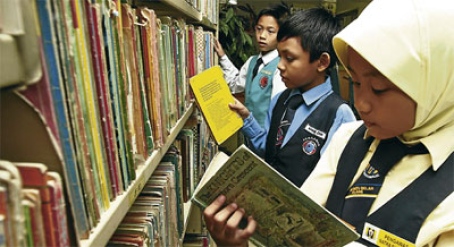Breathing new life into libraries
Professor Tan Sri Dato' Dzulkifli Abdul Razak
Learning Curve: Perspective
New Sunday Times - 14-07-2013
LIBRARY 2.0 MODEL: Its role in the 21st century

Pupils browsing the book shelves at Selangor Public Library in Jalan Tengku Kelana
PRIME Minister Datuk Seri Najib Razak hit the nail on the head when he commented that libraries need a new lease on life.
His twitter message, "Rejuvenate the libraries in order to remain relevant to society", says it all. It is more than just keeping the reading culture alive.
It is difficult to picture a "knowledge society" without libraries as anchor institutions for it to thrive.
We have disproportionately more shopping malls than libraries because we are a consumerist society.
If there are bookstores at those complexes, many tomes are wrapped in plastic and there are no browsing copies available.
Books are generally pricey. At times, curt notices such as "No free reading!" are put next to the books as though we can judge a book by its cover, going against the adage that says the reverse.
Bookstores have difficulty stocking the latest titles, let alone survive.
I can count offhand the number of stores that have closed down in Penang in recent years.
One of the largest bookstores at a premier shopping mall recently reduced its floor space to about a third with a garment outlet occupying the rest!
The bookstore is now a three-in-one -- it shares space with an electronic shop and a café!
Naturally, the selection of books and reading materials has dwindled remarkably.
In this sad scenario, a library as a public service institution is a much welcomed alternative.
Science fiction writer Isaac Asimov said: "For an impoverished child whose family could not afford to buy books, the library was the open door to wonder and achievement, and I can never be sufficiently grateful that I had the wit to charge through that door and make the most of it."
In comparison, there were over 400,000 books in more than 50 libraries with some 500 librarians serving a population of half a million in 10th century Cordoba.
Centres of learning proliferated then.
Take any city centre in Malaysia with roughly that population size and compare its statistics.
A town with a university in its vicinity may be an exception in terms of the number of books, but with some libraries stingy with their budget for reading material, it is not surprising that 21st century cities in Malaysia pale in comparison!
In light of scientific and technological advances and innovations, what is the role of a 21st century library?
Some have envisaged that libraries are no longer just repositories of the past but also active co-creators of knowledge for the future.
At the heart of a library is a user-centred space that encourages constant and purposeful change by inviting user participation in the creation of the services he wants.
The ownership belongs to the user with rules set by his needs.
This Library 2.0 model goes beyond a passive and linear function offering mere tangible and unilateral services -- a one-size-fits-all model or solution for a singular, elitist purpose.
It reflects the new role of a library in an era of participatory culture where social media rules.
Najib's call to "rejuvenate" libraries recognises the need to reinvent and transform what it means for the millennial generation with the emerging semantic web as one of the tools to enhance the definition of a knowledge society.
Bear in mind that knowledge is fast becoming a "rhizome" in its expansionary process that embraces inclusiveness and hybridity towards equity, accessibility, availability, affordability and participation in the creation of relevant quality content and reciprocity while engaging with the community.
The most important of all is to humanise the library by having a people-first strategy as a change agent and creating public value and social equity that will impact changing realities and literacies.
Libraries should be linked to culture, information and knowledge in order to co-create to ensure quality of life and promote human dignity and wisdom.
- The writer is the vice-chancellor of the Albukhary International University
